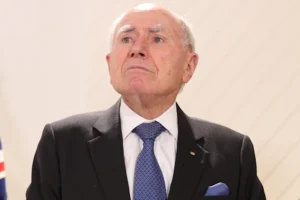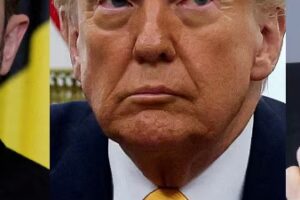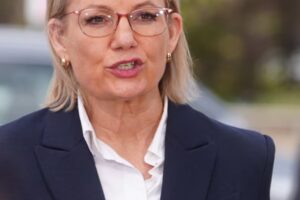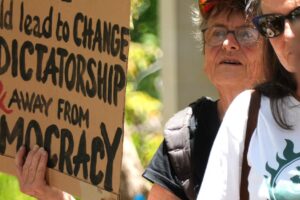
Australia will seek to exploit its comparatively low tariff rate enacted by US President Donald Trump by exporting more products into the United States.
The order signed by Mr Trump has imposed new tariffs on some nations, but Australia has — for now — held onto its minimum 10 per cent “baseline” tariff rate, escaping a threat suggested by the president to lift that to 15 or 20 per cent.
Trade Minister Don Farrell said Australian wine, beef, lamb, wheat and other products were now “cheaper” in a relative sense, and the government would seek to capitalise on that.
“As a government, we will assist all of our exporters in ensuring we take advantage of this situation and increase the volume of exports, not just to the US, but all of those other countries that we have diversified with,” Senator Farrell said.
“I think this is a vindication for the Albanese government and particularly the prime minister in the cool and calm way we have conducted diplomacy with the United States.
“I am hopeful this is the end of the matter now and the American government maintains that 10 per cent [tariff], and our producers, our wine makers, can get back to normal relations with the United States.”
The Trump administration has taken umbrage against countries that were in a trade surplus with the US, or where it perceived countries had unfair trade barriers restricting US trade, in some cases imposing harsher tariffs as a retaliatory measure.
Mr Trump has also used the tariffs to encourage companies to move their operations to the US.
Senator Farrell noted the US still exported more than double the value of goods into Australia than was sold by Australia to the US.
A report by Meat and Livestock Australia released in June found the threat of tariffs on beef had not hurt trade, which had risen 32 per cent year-to-date.
Possible 200 per cent drug tariff still hangs over Australia
While the government has claimed victory for its tactics in the face of fierce criticism from the Coalition for not yet securing a face-to-face meeting with Mr Trump, the president is still weighing further tariffs that could have a more significant impact on Australia.
Mr Trump is mulling a 200 per cent tariff on pharmaceuticals, one of Australia’s largest export products to the US, which are currently exempt from the administration’s tariff schedule.
The president said earlier this month he had held off from committing to that tariff to give manufacturers time to move their operations to the US to avoid the tax.
Last year, Australia exported $2.2 billion in pharmaceutical products to the US, about 40 per cent of Australia’s pharmaceutical exports, according to the UN’s Comtrade database.
Mr Trump has also continued a grievance with drug companies selling medicines cheaper to foreign nations under programs like the Pharmaceutical Benefits Scheme (PBS).
Overnight, he wrote to several pharmaceutical giants demanding they price US drugs no more expensive than prices negotiated overseas, asserting they would have to take a tougher negotiating position with foreign nations to do so.
Senator Farrell said he did not expect that to affect Australian drug prices, repeating that the government would never put Australia’s PBS “at risk” in trade talks with the US.
Under the PBS, the government negotiates greatly reduced prices with drug makers in order for medicines to be listed and heavily subsidised, wiping hundreds or even thousands of dollars from their sale price for customers.
The minister repeated the government’s view that the Trump administration’s tariffs were an act of economic self-harm by the states, and it did not support them.





